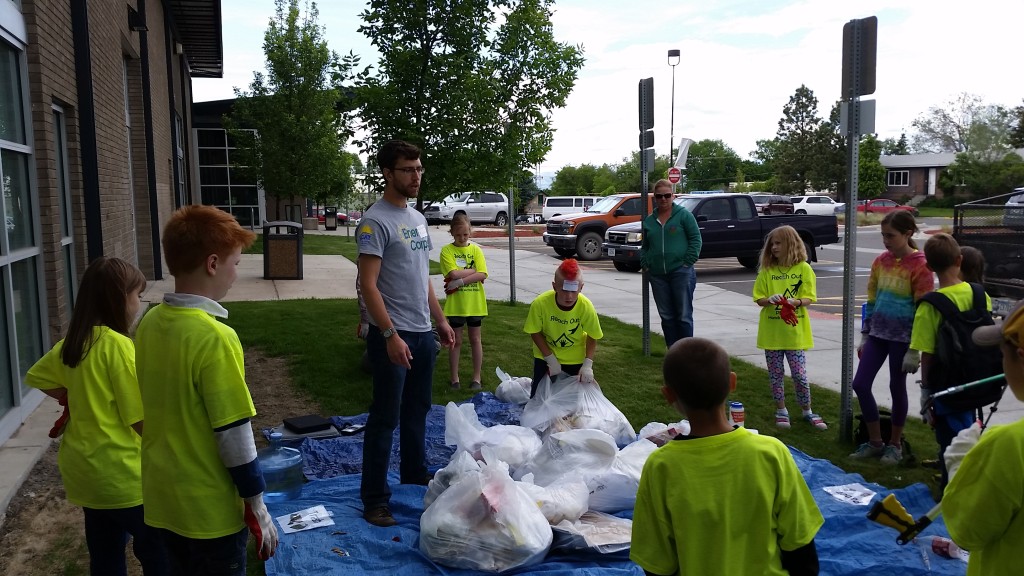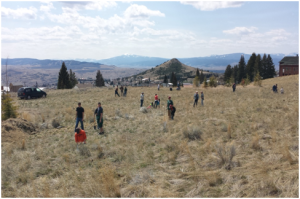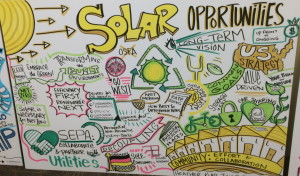Read about Rob’s experience as a waste reduction educator:
I rarely get to have a deep conversation with people when I first meet them. As an educator, I yearn for this missing depth. A few facts and figures, some examples of innovation, encouraging words, and that’s about as much as I can fit into a presentation about recycling. I am positive that I leave an impression on all of the students I meet, but I always want to do more. I could accomplish much more through deep conversations about recycling, waste, manufacturing, and our behavior within a disposable society – yet, 25 to 45 minutes allows me to only scratch the surface.
 To understand why we need to recycle, it is helpful to know the history of waste and its management. Well, not very many people are interested in sitting while a stranger talks about dumping, incinerators, and landfills for hours so that’s out of the question. Instead, I can provide modern context to ideas surrounding waste reduction and recycling by engaging students in a waste audit. Examining our trash – playing “archaeologist” – is a great way to study our unsupervised behavior and gain an understanding of consumer choices. Separating our waste into categories allows us to analyze each piece individually and ask more in- depth questions: What’s the difference between these types of plastic and why can’t I recycle all of them? How much grease on cardboard is too much? Is there enough food waste here to warrant a compost bin?
To understand why we need to recycle, it is helpful to know the history of waste and its management. Well, not very many people are interested in sitting while a stranger talks about dumping, incinerators, and landfills for hours so that’s out of the question. Instead, I can provide modern context to ideas surrounding waste reduction and recycling by engaging students in a waste audit. Examining our trash – playing “archaeologist” – is a great way to study our unsupervised behavior and gain an understanding of consumer choices. Separating our waste into categories allows us to analyze each piece individually and ask more in- depth questions: What’s the difference between these types of plastic and why can’t I recycle all of them? How much grease on cardboard is too much? Is there enough food waste here to warrant a compost bin?
 I led a waste audit with students in Helena earlier this week and I could actually notice them thinking harder about each item they separated. At first I asked them questions to see if they could guess what to do with certain items, then about halfway through they were asking me questions about plastic-coated cardboard, and towards the end they knew exactly where everything needed to go. This is the depth that can really make a difference – I plan to continue providing more than information and aim to guide students through meaningful experiences.
I led a waste audit with students in Helena earlier this week and I could actually notice them thinking harder about each item they separated. At first I asked them questions to see if they could guess what to do with certain items, then about halfway through they were asking me questions about plastic-coated cardboard, and towards the end they knew exactly where everything needed to go. This is the depth that can really make a difference – I plan to continue providing more than information and aim to guide students through meaningful experiences.
 Rob Pudner has a degree in Environmental Studies from Green Mountain College in Vermont, where he became deeply involved with recycling operations. He was the head of the recycling crew, reestablished a composting program, and presented to first year students about proper recycling. One of his favorite projects as a student was establishing a campus free store to reduce campus waste. Rob is serving at Recycle Montana where his primary role is increasing the capacity of organization to assist service organizations working to provide recycling opportunities within their communities. He will be utilizing existing educational resources and developing best practices for recycling materials that can be presented to schools and communities throughout Montana.
Rob Pudner has a degree in Environmental Studies from Green Mountain College in Vermont, where he became deeply involved with recycling operations. He was the head of the recycling crew, reestablished a composting program, and presented to first year students about proper recycling. One of his favorite projects as a student was establishing a campus free store to reduce campus waste. Rob is serving at Recycle Montana where his primary role is increasing the capacity of organization to assist service organizations working to provide recycling opportunities within their communities. He will be utilizing existing educational resources and developing best practices for recycling materials that can be presented to schools and communities throughout Montana.








